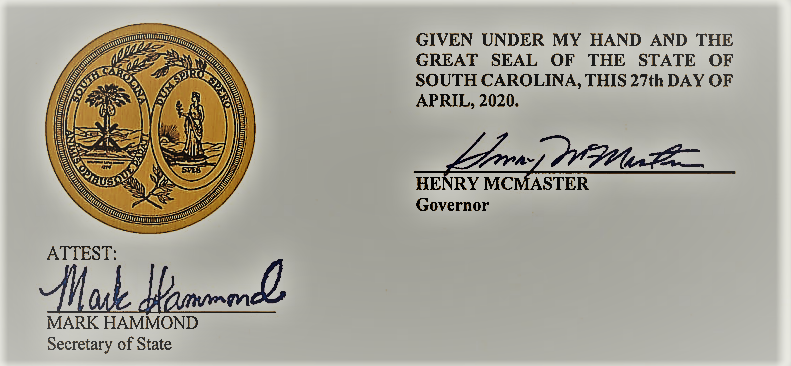Whereas, Article 7, Chapter 3, Title 25 of the South Carolina Code of Laws vests the Governor with the authority to declare a State of Emergency so that he can exercise extraordinary powers to address the effects of an emergency that has arisen; and
Whereas, the Governor’s authority during an emergency is not limitless. Even during a State of Emergency, the Governor can only exercise as much authority as the law provides and for only as long as the law provides; and
Whereas, Section 25-1-440(a)(2) of the South Carolina Code of Laws provides that the Governor may not issue a State of Emergency “for a period of more than fifteen days without the consent of the General Assembly”; and
Whereas, Section 25-1-440(a)(2) of the South Carolina Code of Laws is properly interpreted to require the explicit consent of the General Assembly for a declared State of Emergency to continue for a period of more than fifteen days; and
Whereas, Governor Henry D. McMaster has issued a series of consecutive States of Emergency in response to the COVID-19 pandemic, each lasting for fifteen days, rather than extending the original State of Emergency. Some have argued that the Governor has chosen this course of action to circumvent the consent requirement in Section 25-1-440(a)(2). The Governor’s position is that the multiple States of Emergency are warranted because changing circumstances or new threats as the pandemic spreads constitute a new emergency, which, in turn, justify a new declaration; and
Whereas, on March 13, 2020, Governor McMaster issued Executive Order No. 2020-09, declaring a State of Emergency in South Carolina in response to the imminent risk of COVID-19 posing a qualifying health condition pursuant to Section 44-4-130 of the South Carolina Code of Laws, thus authorizing him to exercise extraordinary emergency powers under the laws and Constitution of this State. The State of Emergency remained in effect for fifteen days as provided in Section 25-1-440(a)(2) of the South Carolina Code of Laws; and
Whereas, on March 28, 2020, Governor McMaster issued Executive Order No. 2020-15, declaring a new State of Emergency in South Carolina. The second State of Emergency was effective immediately upon the expiration of the first State of Emergency. The basis for the Governor’s declaration of a second State of Emergency was that the COVID-19 pandemic’s evolution from an imminent risk to the actual occurrence of a qualifying health condition affecting the entire State presented a sufficient change in circumstances and new threats justifying a new State of Emergency declaration. The second State of Emergency remained in effect for fifteen days. The second State of Emergency expired on April 12, 2020; and
Whereas, on April 12, 2020, Governor McMaster issued Executive Order No. 2020-23, declaring a third State of Emergency in South Carolina. The third State of Emergency was effective immediately upon the expiration of the second State of Emergency. The Governor declared the third State of Emergency based upon the argument that “the accelerated spread of COVID-19 throughout the State” presented a sufficient change in circumstances and new threats from those that justified the first State of Emergency. The third State of Emergency remained in effect for fifteen days as provided in Section 25-1-440(a)(2) of the South Carolina Code of Laws. The third State of Emergency expired on April 27, 2020; and
Whereas, on April 27, 2020, Governor McMaster issued Executive Order No. 2020-29, declaring a fourth State of Emergency in South Carolina. The fourth State of Emergency was effective immediately upon the expiration of the third State of Emergency. The Governor declared the fourth State of Emergency based upon the argument that “recent developments, new facts, changing circumstances” presented a sufficient change in circumstances and new threats from those that justified the third State of Emergency. The fourth State of Emergency remained in effect for fifteen days as provided in Section 25-1-440(a)(2) of the South Carolina Code of Laws. The fourth State of Emergency expired on May 12, 2020; and
Whereas, the General Assembly reconvened on May 12, 2020 after adjourning subject to the call of the President of the Senate and the Speaker of the House of Representatives in response to the COVID-19 pandemic. Now, therefore,
Be it resolved by the Senate, the House of Representatives concurring:
That it is the sense of the General Assembly that changing circumstances or a change in the degree of the impact of the underlying imminent or actual threat, event, occurrence, or similar incident giving rise to a State of Emergency are not sufficient grounds upon which to declare a State of Emergency subsequent to a State of Emergency declared pursuant to Section 25-1-440(a)(2).
Be it further resolved by the Senate, the House of Representatives concurring:
That it is the sense of the General Assembly that it is the Governor’s duty to ask for consent if a state of emergency needs to be extended beyond fifteen days and that it is the General Assembly’s duty to give consent in a timely manner if the General Assembly determines that such an extension is warranted. If explicit consent is not given by the General Assembly the State of Emergency expires fifteen days after declared.
Be it further resolved that a copy of this resolution be presented to His Excellency, the Governor of the State of South Carolina, Henry D. McMaster.


Recent Comments